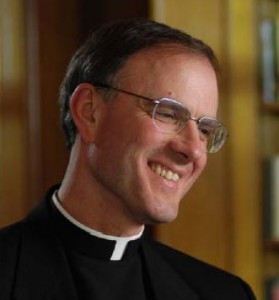Episode 1 Praying with Scripture: Christian Contemplation and Mediation in the Ignatian tradition with Fr. TimothyÂ
Fr. Gallagher introduces us to meditation and contemplation – the cornerstones of Ignatius of Loyola’s spiritual practice.
[powerpress]
For other episodes in the series visit The Discerning Hearts “Praying with Scripture†page
Father Timothy M. Gallagher, O.M.V., was ordained in 1979 as a member of the Oblates of the Virgin Mary, a religious community dedicated to retreats and spiritual formation according to the Spiritual Exercises of St. Ignatius. Â Fr. Gallagher is featured on the EWTN series “Living the Discerning Life: Â The Spiritual Teachings of St. Ignatius of Loyola”.
For more information on how to obtain copies of Fr. Gallaghers’s various books and audio which are available for purchase, please visit  his  website:   frtimothygallagher.org
 For the other episodes in this series check out Fr. Timothy Gallagher’s “Discerning Hearts†page
Tags: catholic, catholic podcast, catholic prayer, cathollc spirituality, Christian Contemplation, contemplation, discerning heart, Discerning Hearts, Father Timothy M. Gallagher, Gallagher, Ignatian tradition, meditation, scripture, spiritual exercises, spiritual formation, st. ignatius, st. ignatius of loyola, Timothy Gallagher
This entry was posted on Monday, June 16th, 2014 at 7:11 am
You can follow any responses to this entry through the RSS 2.0 feed.
Episode 2 The Discernment of  Spirits: Setting the Captives Free – The life of St. Ignatius of Loyola and the foundational elements of the Spiritual Exercises
[powerpress]
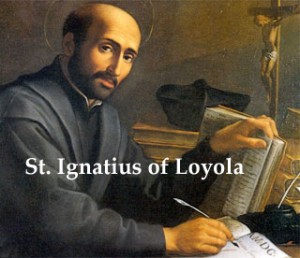 The Discernment of Spirits: Setting the Captives Free – Serves as an introduction to the Spiritual Exercises of St. Ignatius of Loyola
The Discernment of Spirits: Setting the Captives Free – Serves as an introduction to the Spiritual Exercises of St. Ignatius of Loyola
The 14 Rules for Discerning Spirits –
“The Different Movements Which Are Caused In The Soul”
as outlined by St. Ignatius of Loyola
can be found here
Father Timothy M. Gallagher, O.M.V., was ordained in 1979 as a member of the Oblates of the Virgin Mary, a religious community dedicated to retreats and spiritual formation according to the Spiritual Exercises of St. Ignatius. Â Fr. Gallagher is featured on the EWTN series “Living the Discerning Life: Â The Spiritual Teachings of St. Ignatius of Loyola”.Â
For more information on how to obtain copies of Fr. Gallaghers’s various books and audio which are available for purchase, please visit  his  website: www.frtimothygallagher.org
 For the other episodes in this series visit
Fr. Timothy Gallagher’s “Discerning Hearts†page
Tags: discernment of spirits, st. ignatius of loyola, Timothy Gallagher
This entry was posted on Monday, November 18th, 2013 at 7:53 am
You can follow any responses to this entry through the RSS 2.0 feed.
 Here is a special interview we had with Fr. James Martin, SJ discussing St. Ignatius of Loyola
Here is a special interview we had with Fr. James Martin, SJ discussing St. Ignatius of Loyola
[powerpress]
ADDRESS OF HIS HOLINESS BENEDICT XVI
TO THE FATHERS AND BROTHERS OF THE SOCIETY OF JESUS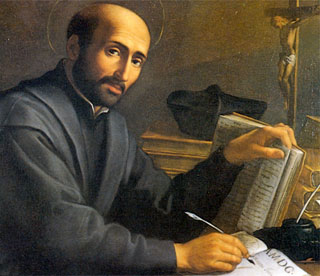
Vatican Basilica
Saturday, 22 April 2006 Â from vatican.va
Dear Fathers and Brothers of the Society of Jesus,
I meet you with great joy in this historical Basilica of St Peter’s after the Holy Mass celebrated for you by Cardinal Angelo Sodano, my Secretary of State, on the occasion of combined jubilees of the Ignatian Family. I address my cordial greeting to you all.
I greet in the first place the Superior General, Fr Peter-Hans Kolvenbach, and thank him for his courteous words expressing your common sentiments to me. I greet the Cardinals with the Bishops and priests and all those who have desired to participate in this event.
Together with the Fathers and Brothers, I also greet the friends of the Society of Jesus present here, and among them, the
many men and women religious, members of the Communities of Christian Life and of the Apostolate of Prayer, the students and alumnae with their families from Rome, from Italy and from Stonyhurst in England, the teachers and students of the academic institutions and the many collaborators.
Your visit today gives me the opportunity to thank the Lord with you for having granted your Society the gift of men of extraordinary holiness and exceptional apostolic zeal, such as St Ignatius of Loyola, St Francis Xavier and Bl. Peter Faber. For you they are the Fathers and Founders: it is therefore appropriate that in this centenary year you commemorate them with gratitude and look to them as enlightened and reliable guides on your spiritual journey and in your apostolic activities.
St Ignatius of Loyola was first and foremost a man of God who in his life put God, his greatest glory and his greatest service, first. He was a profoundly prayerful man for whom the daily celebration of the Eucharist was the heart and crowning point of his day.
Thus, he left his followers a precious spiritual legacy that must not be lost or forgotten. Precisely because he was a man of God, St Ignatius was a faithful servant of the Church, in which he saw and venerated the Bride of the Lord and the Mother of Christians. And the special vow of obedience to the Pope, which he himself describes as “our first and principal foundation” (MI, Series III, I., p. 162), was born from his desire to serve the Church in the most beneficial way possible. (more…)
Tags: american magazine, celebration, fr. james martin, heart, James Martin, st. ignatius, st. ignatius of loyola
This entry was posted on Wednesday, July 31st, 2013 at 1:45 am
You can follow any responses to this entry through the RSS 2.0 feed.
 The video above provides a wonderful telling of the experiences of St. Ignatius prior to founding the Jesuits. Â Contained in those stories is the encounter St. Ignatius had with a Moor on the road, and how a mule aided him in a time of much needed discernment. Â A fascinating tale.
The video above provides a wonderful telling of the experiences of St. Ignatius prior to founding the Jesuits. Â Contained in those stories is the encounter St. Ignatius had with a Moor on the road, and how a mule aided him in a time of much needed discernment. Â A fascinating tale.
Tags: discernment, jesuits, st. ignatius of loyola
This entry was posted on Wednesday, July 31st, 2013 at 12:45 am
You can follow any responses to this entry through the RSS 2.0 feed.
[powerpress] Day 7
From the writings of St. Ignatius of Loyola: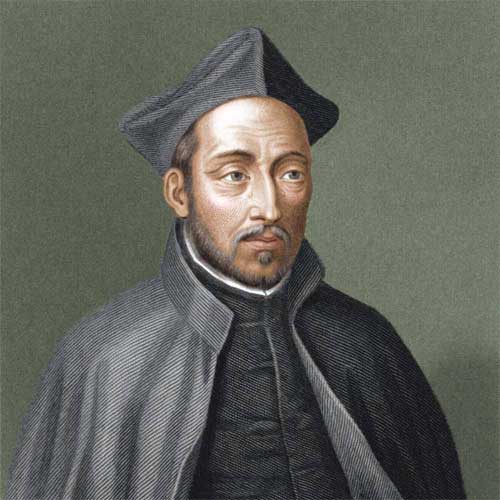
If the devil praises us, we must humble ourselves reflecting on our sins and wretchedness. If he abases us and keeps us down, we must then lift ourselves up in true faith and hope in our Lord, recalling to mind the benefits we have received from Him and with how much love and affection He is waiting to save us. The enemy is totally unconcerned whether he speaks the truth or tells lies; his only desire is to overcome us [Ep. 1:102].
When you find yourself being tempted by the enemy of human nature. . .you must fearlessly state and declare that you are a follower of the Lord and that you would rather die than leave His service [Ep. 1:103].
Our Father….
With St. Ignatius we pray:
Soul of Christ, sanctify me.
Body of Christ, save me. Blood of Christ, inebriate me.
Water from the side of Christ, wash me.
Passion of Christ, strengthen me.
O Good Jesus, hear me.
Within Thy wounds hide me.
Suffer me not to be separated from thee.
From the malignant enemy defend me.
In the hour of my death call me.
And bid me come unto Thee,
That with all Thy saints,
I may praise thee Forever and ever.
Amen.
St. Ignatius of Loyola, pray for us
Tags: st. ignatius of loyola
This entry was posted on Sunday, July 29th, 2012 at 12:12 am
You can follow any responses to this entry through the RSS 2.0 feed.
[powerpress] Day 6
From the writings of St. Ignatius of Loyola:
If we desire to live in honor and to be esteemed by our neighbors, then we shall never be solidly rooted in God our Lord, and it will be impossible for us to remain undisturbed when insults come our way [Ep. 1:86].
If we find that we are without the patience to endure insults from others we, then, have greater reason to complain, not because of those who injure us, but because of our own sensuality and carnal inclinations, and because we are not as mortified or dead to the world as we should be. These people are offering us opportunities for gaining a treasure greater than anyone can win in this life, and riches more numerous than anyone can accumulate in this world [Ep. 1:86-87].
Our Father….
With St. Ignatius we pray:
Soul of Christ, sanctify me.
Body of Christ, save me. Blood of Christ, inebriate me.
Water from the side of Christ, wash me.
Passion of Christ, strengthen me.
O Good Jesus, hear me.
Within Thy wounds hide me.
Suffer me not to be separated from thee.
From the malignant enemy defend me.
In the hour of my death call me.
And bid me come unto Thee,
That with all Thy saints,
I may praise thee Forever and ever.
Amen.
St. Ignatius of Loyola, pray for us
Tags: st. ignatius of loyola
This entry was posted on Saturday, July 28th, 2012 at 8:22 am
You can follow any responses to this entry through the RSS 2.0 feed.
[powerpress] Day 5
From the writings of St. Ignatius of Loyola:
We should praise all the laws of the Church, keeping our minds ever ready to seek reasons to defend them and not to oppose them [Spir. Exer., “Rules for Thinking with the Church”].
I must remind you to frequent the sacraments, to read spiritual books, and to pray with as much recollection as you possibly can. Every day set aside some time so that the soul will not be without its food and, thus, you will not be induced to complain like the one who said “My heart has withered because I have forgotten to eat my bread” (Psalm 102:4) [Ep. 6:524].
Our Father….
With St. Ignatius we pray:
Soul of Christ, sanctify me.
Body of Christ, save me. Blood of Christ, inebriate me.
Water from the side of Christ, wash me.
Passion of Christ, strengthen me.
O Good Jesus, hear me.
Within Thy wounds hide me.
Suffer me not to be separated from thee.
From the malignant enemy defend me.
In the hour of my death call me.
And bid me come unto Thee,
That with all Thy saints,
I may praise thee Forever and ever.
Amen.
St. Ignatius of Loyola, pray for us
Tags: st. ignatius of loyola
This entry was posted on Friday, July 27th, 2012 at 7:06 am
You can follow any responses to this entry through the RSS 2.0 feed.
[powerpress]
Day 4
From the writings of St. Ignatius of Loyola: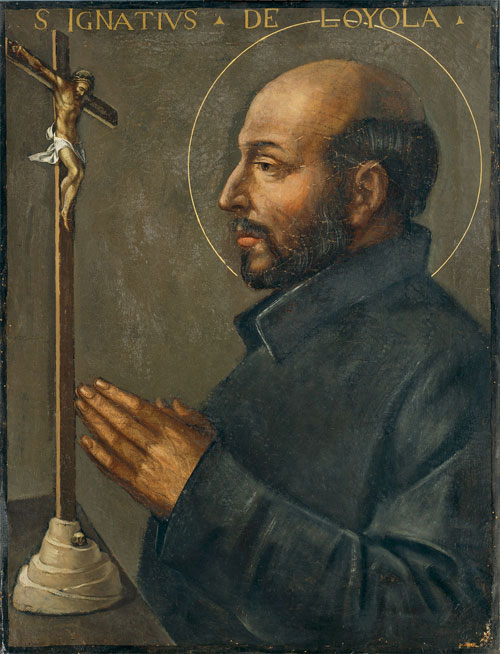
I desire for you the joy and full consolation of soul that I desire for myself, and I sympathize with you in your trials. . .but I consider this a very special gift of God our Lord for He is providing you with an occasion to practice patience, as well as faith and hope in Him [Ep. 6:161].
In the life which is eternal and without end God will reward your patience with indescribable joy and glory; there will be no trials, sadness, or discomfort—for there are none of these in heaven—but only the fulfillment of every joy and happiness [Ep. 6:161].
Our Father….
With St. Ignatius we pray:
Soul of Christ, sanctify me.
Body of Christ, save me.
Blood of Christ, inebriate me.
Water from the side of Christ, wash me.
Passion of Christ, strengthen me.
O Good Jesus, hear me.
Within Thy wounds hide me.
Suffer me not to be separated from thee.
From the malignant enemy defend me.
In the hour of my death call me.
And bid me come unto Thee,
That with all Thy saints,
I may praise thee
Forever and ever.
Amen.
St. Ignatius of Loyola, pray for us
Tags: st. ignatius of loyola
This entry was posted on Thursday, July 26th, 2012 at 12:25 am
You can follow any responses to this entry through the RSS 2.0 feed.
[powerpress]
Day 3
From the writings of St. Ignatius of Loyola: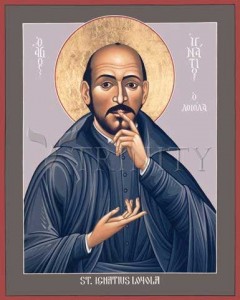
The peace of our Lord is something interior, and it brings with it all the other gifts and graces necessary for salvation and eternal life. This peace makes us love our neighbor for the love of our Creator and Lord, and because of this same love we observe all the commandments of the law, as St. Paul says: “He who loves his neighbor has fulfilled the law” (Romans 13:8). He has fulfilled the law because he loves his Creator and Lord and loves his neighbor for his Lord’s sake [Ep. 1:162].
Our Father….
With St. Ignatius we pray:
Soul of Christ, sanctify me.
Body of Christ, save me.
Blood of Christ, inebriate me.
Water from the side of Christ, wash me.
Passion of Christ, strengthen me.
O Good Jesus, hear me.
Within Thy wounds hide me.
Suffer me not to be separated from thee.
From the malignant enemy defend me.
In the hour of my death call me.
And bid me come unto Thee,
That with all Thy saints,
I may praise thee
Forever and ever.
Amen.
St. Ignatius of Loyola, pray for us
Tags: st. ignatius of loyola
This entry was posted on Wednesday, July 25th, 2012 at 12:09 am
You can follow any responses to this entry through the RSS 2.0 feed.
[powerpress]
Day 2
From the writings of St. Ignatius of Loyola:
You are much deceived in thinking that the cause of your unrest and little progress in following the way of the Lord comes from the place where you live, or your superiors, or your brethren. This unrest comes from within you, that is, it comes from your own lack of humility, obedience, and prayer, and finally from a want of mortification and fervor in advancing in the way of perfection. You could have a change in residence, of superiors, and of brethren, but if the interior man is not changed these other changes will do you no good. Everywhere will be the same for you, unless you become humble, obedient, devout, and you mortify your self-love. This is the change you should seek and no other [Ep. 8:328-329].
Our Father….
With St. Ignatius we pray:
Soul of Christ, sanctify me.
Body of Christ, save me.
Blood of Christ, inebriate me.
Water from the side of Christ, wash me.
Passion of Christ, strengthen me.
O Good Jesus, hear me.
Within Thy wounds hide me.
Suffer me not to be separated from thee.
From the malignant enemy defend me.
In the hour of my death call me.
And bid me come unto Thee,
That with all Thy saints,
I may praise thee
Forever and ever.
Amen.
St. Ignatius of Loyola, pray for us
Tags: st. ignatius of loyola
This entry was posted on Tuesday, July 24th, 2012 at 12:25 am
You can follow any responses to this entry through the RSS 2.0 feed.
[powerpress]
Day 1
From the writings of St. Ignatius of Loyola:
The moment you decided to use all your strength in praising, honoring, and serving God our Lord, that was the moment you entered battle with the world, raised your standards against it, and made yourself ready to reject all that is exalted by embracing all that is lowly. At the same time you resolved to accept with indifference positions high or low, honor or dishonor, riches or poverty, to be loved or hated, to be appreciated or scorned—in short, the world’s glory or the injuries it could inflict upon you
If we desire to live in honor and to be esteemed by our neighbors, then we shall never be solidly rooted in God our Lord, and it will be impossible for us to remain undisturbed when insults come our way
Our Father….
With St. Ignatius we pray:
Soul of Christ, sanctify me.
Body of Christ, save me.
Blood of Christ, inebriate me.
Water from the side of Christ, wash me.
Passion of Christ, strengthen me.
O Good Jesus, hear me.
Within Thy wounds hide me.
Suffer me not to be separated from thee.
From the malignant enemy defend me.
In the hour of my death call me.
And bid me come unto Thee,
That with all Thy saints,
I may praise thee
Forever and ever.
Amen.
St. Ignatius of Loyola, pray for us
Tags: st. ignatius of loyola
This entry was posted on Monday, July 23rd, 2012 at 4:10 pm
You can follow any responses to this entry through the RSS 2.0 feed.
In my book, every missionary is great. It takes a great amount of courage and zeal, along with a great deal of faith, hope, and love, to proclaim Christ crucified to the world no matter what age you live in, no matter where you travel…whether next door or to a far away land. One of those who has inspired so many is St. Francis Xavier. Omar Gutierrez does another fine job bringing this saint’s witness deeper into our hearts….
crucified to the world no matter what age you live in, no matter where you travel…whether next door or to a far away land. One of those who has inspired so many is St. Francis Xavier. Omar Gutierrez does another fine job bringing this saint’s witness deeper into our hearts….
For the Love of Neighbor…
by Omar F. A. Gutierrez  Along a rather busy street in Rome, as one walks along with various-colored motorini passing by in the typical Italian nonchalance, there stands a rather impressive façade of a Church. Churches in Rome are not rarities. Edifices of worship, shrines and even bits of images of the Blessed Virgin dot the city’s corners and crevices throughout. Here, though, with buildings rising tightly upward, is a church with a piazza that stands resolute. The Church is named after Jesus and is referred to by the Italian Gesù.
Along a rather busy street in Rome, as one walks along with various-colored motorini passing by in the typical Italian nonchalance, there stands a rather impressive façade of a Church. Churches in Rome are not rarities. Edifices of worship, shrines and even bits of images of the Blessed Virgin dot the city’s corners and crevices throughout. Here, though, with buildings rising tightly upward, is a church with a piazza that stands resolute. The Church is named after Jesus and is referred to by the Italian Gesù.
Inside the Gesù, amidst the distracting busyness of the Baroque interior, one will find the remains of St. Ignatius of Loyola, the punctilious and perceptive Spaniard who founded the order known as the Society of Jesus, the Jesuits. Across the nave, though, is an oddly obvious glass display case gilt with gold and silver. Above this floats the golden form of an angel whose wings and flowing robes give a good deal of attention to the case, for inside the case, in that only-too-Catholic fashion, is… a forearm.
The forearm belonged, or I suppose I should say that it still belongs to another Spaniard who met St. Ignatius at the University of Paris whilst the two of them studied theology. The forearm is on display not in mere virtue of its owner’s friendship with Ignatius. It is on display because its owner, St. Francis Xavier, was one of the most successful missionaries in the history of Christianity. That forearm, black and no doubt by now quite brittle, baptized more souls than perhaps any since the early baptisms of thousands one reads about in the Scriptures.
St. Francis Xavier was born in 1506. When he met St. Ignatius of Loyola, it did not take long for him and five others to join Ignatius in 1534 and be those magnificent seven souls to start the Jesuit order that would transform the world. Nor did it take long, after their order had found some grounding, for St. Francis to be sent by St. Ignatius to go and preach to the world, as Jesus had commanded. St. Francis and his companions, Fr. Paul of Camarino and Francis Mansilhas, sailed from Portugal for India in 1541.
The story of his work in India is dazzling. Certainly Christianity had already been in parts of India, and been there for over a thousand years. However, large swaths of the land were still not evangelized, and anyway the Christians there needed the catechetical and spiritual support of ones like St. Francis, who traveled extensively regardless of danger, time, or geography. What is more astonishing is that the zeal which St. Francis held in that fiery heart of his was not quenched by the successes of India, Ceylon, and the nearby regions. St. Francis heard of a land in which Christianity had never come, Japan, and was compelled to do something about it.
In 1549, he and some companions set out for Japan and landed in Kagoshima. In a year they had 100 converts. Considering this a pittance, Francis pressed onward. At Hirado he was well received and converts came in the droves. His forearm tired at the effort of so many baptisms. Still he pressed on. By the time he left Japan in 1551 at least 2,000 Japanese had been baptized. But there were more lands to be given the Gospel.
I n August of 1552, St. Francis was off again, this time to China. Unfortunately, he fell ill there and died a short time after, on December 3, 1552.
n August of 1552, St. Francis was off again, this time to China. Unfortunately, he fell ill there and died a short time after, on December 3, 1552.
Some of the marks of St. Francis’ story are truly wonderful to relate, not the least of these is the sheer number of baptisms he performed during his eleven years of service in Asia. Modern estimates of his work put him at about 30,000 baptisms. To put that in perspective a bit, that means that St. Francis Xavier would have baptized between 7 and 8 people every day for eleven straight years.
Though he worked to learn the many languages of the lands in which he preached, of course keeping in mind that he would have already known Basque, Spanish, Latin, French, Italian, and Portuguese, he did not have the gift of tongues. The languages he picked up on in India and elsewhere were the result of grueling work on his part. He was not gifted as some are with languages. He had to work hard. This therefore meant that he got creative. He used art a good deal in the attempt to communicate the fundamentals of the faith and as a tool to remember creeds. He also met the people “where they were at,†as the saying goes these days. To the Indians he lived as they did in extreme poverty, eating only rice and water, sleeping on the ground in a hut. In Japan, this would not do. So he dressed richly and presented the local magistrate with fine gifts. This was well received, and he gained instant respect and thus an audience with attentive ears.
Just a couple of last points about St. Francis: first, his travels throughout the world included missionary work not just for the unbaptized but almost especially to already baptized Catholics. Imagine you’ve just sailed the seas for over a year in order to do work in a land far stranger to you than any you’ve ever visited. Upon arriving you discover that the port town is largely Christian. But then you witness what Fr. Butler will describe as the “ambition, avarice, usury, and debauchery†of the Christians there.
The sacraments were neglected, there were not four preachers and no priests outside the walls of Goa; when slaves were atrociously beaten, their masters counted the blows on the beads of their rosaries.
Fr. H. J. Colerdige, S.J. one of the biographers of St. Francis relates the following,
There has probably never yet been a zealous European missionary in any part of the heathen world in which Christians from his own country have been settled, or which they have occasionally visited for purposes of commerce, who has not found among them the worst enemies to his work. No exception can be made as to this lamentable truth in favour of Catholic nations: Spaniards, Frenchmen, Portuguese have as much to answer for in this respect as Dutchmen and Englishmen.
In other words, no Christian missionary has been spared the embarrassment of having to explain to the prospective flock the atrocious behavior of Christians. St. Francis had clearly a lot to do for the Christians already there in Goa. Normally, we…normally I would have thrown in the towel at that point. What is the purpose of preaching the Gospel when the very people who are supposed to be living it are behaving so poorly? Have you not asked yourself thi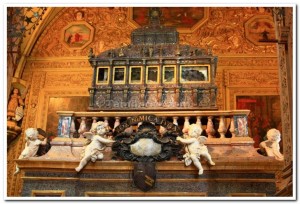 s question?
s question?
The rest of St. Francis Xavier in the Basilica of Bom Gesu in Goa, India
I dare say that we’ve all experienced something like this in our lives. Have we heard the line that the Church is in more danger of corruption from Catholics within than from non-Catholics without? There is something true in that saying I think. Yet St. Francis pressed on. His dedication to Christ Jesus was so deeply ingrained in him, that he did not need to know that all Catholics would behave properly for him to fulfill his vocation. All he needed to do was to listen to God, to press on living for Him.
Lastly, I don’t want to suggest that St. Francis was callously dismissive of the atrocities he found. Of them he wrote that they became “a permanent bruise on my soul.†He allowed the love for Christ to inform his care for his neighbor, over against those of his own faith. He wrote once, when an Indian was abducted for the slave trade,
Would the Portuguese be pleased if one of the Hindus were to take a Portuguese by force and carry him up country? The Indians must have the same feelings.
This ability of St. Francis Xavier to be driven by his compassion for his  neighbor well enough to see beyond the natural affinities of nation, ethnicity, and faith… this ability to defend the rights of these downtrodden strangers, only brings me to wonder how we can be Catholic, today in the U.S., and not desire for ourselves more largeness of heart for the immigrant. Immigration is too large an issue to enter into here, but given the life of St. Francis presented above, how do we really think he would behave in our current time? Would he deny prenatal care to a woman because her proximity is illegal? Would he demand his neighbor produce proof of eligibility before offering them something as simple as shelter from the storm? No, St. Francis Xavier wouldn’t, not the great missionary, not the grand heart, not the forearm that helped to reconcile strangers in his valley of tears to the God of our homeland in the heavens.
neighbor well enough to see beyond the natural affinities of nation, ethnicity, and faith… this ability to defend the rights of these downtrodden strangers, only brings me to wonder how we can be Catholic, today in the U.S., and not desire for ourselves more largeness of heart for the immigrant. Immigration is too large an issue to enter into here, but given the life of St. Francis presented above, how do we really think he would behave in our current time? Would he deny prenatal care to a woman because her proximity is illegal? Would he demand his neighbor produce proof of eligibility before offering them something as simple as shelter from the storm? No, St. Francis Xavier wouldn’t, not the great missionary, not the grand heart, not the forearm that helped to reconcile strangers in his valley of tears to the God of our homeland in the heavens.
Perhaps, then, take time this day of St. Francis Xavier and consider the immigrant in our midst, the stranger in a strange land. If you find your heart hardened by the vituperative rhetoric that so dominates our political culture, then I ask you only to pray to St. Francis the Spaniard, St. Francis the missionary, St. Francis the lover who allowed that love to bring Jesus to the world. Perhaps we might raise a forearm, glass in hand of course, and toast with a friend the same love that saved a wretch like me.
In that spirit: St. Francis Xavier…pray for us!
 Thanks Omar for another great post!!! visit Regnum Novum for more by Omar
Thanks Omar for another great post!!! visit Regnum Novum for more by Omar
Tags: catholic, catholic podcast, catholic prayer, cathollc spirituality, china, churches in rome, india, martyr, missionary, society of jesus, st francis xavier, st. ignatius of loyola
This entry was posted on Friday, December 3rd, 2010 at 9:06 am
You can follow any responses to this entry through the RSS 2.0 feed.
 Episode 2 The Discernment of  Spirits: Setting the Captives Free
Episode 2 The Discernment of  Spirits: Setting the Captives Free
The life of St. Ignatius of Loyola and the foundational elements of the Spiritual Exercises
[powerpress]
 The Discernment of Spirits: Setting the Captives Free – Serves as an introduction to the Spiritual Exercises of St. Ignatius of Loyola
The Discernment of Spirits: Setting the Captives Free – Serves as an introduction to the Spiritual Exercises of St. Ignatius of Loyola
The 14 Rules for Discerning Spirits –
“The Different Movements Which Are Caused In The Soul”
as outlined by St. Ignatius of Loyola can be found here
Father Timothy M. Gallagher, O.M.V., was ordained in 1979 as a member of the Oblates of the Virgin Mary, a religious community dedicated to retreats and spiritual formation according to the Spiritual Exercises of St. Ignatius. Â Fr. Gallagher is featured on the EWTN series “Living the Discerning Life: Â The Spiritual Teachings of St. Ignatius of Loyola”.Â
For more information on how to obtain copies of Fr. Gallaghers’s various books and audio which are available for purchase, please visit  his  website: www.frtimothygallagher.org
 For the other episodes in this series visit
Fr. Timothy Gallagher’s “Discerning Hearts†page
Tags: catholic, catholic podcast, catholic prayer, cathollc spirituality, discernment of spirits, st. ignatius of loyola
This entry was posted on Tuesday, October 26th, 2010 at 4:13 pm
You can follow any responses to this entry through the RSS 2.0 feed.

